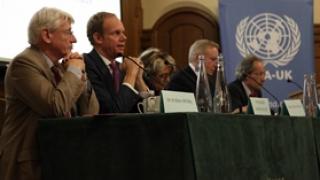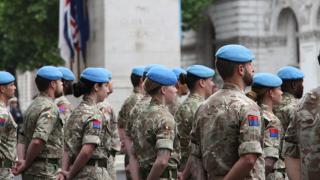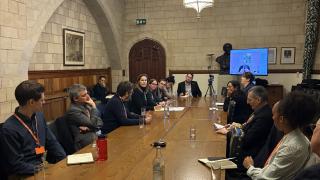
More than 100 former and current United Nations diplomats and civil servants convened in Westminster on 13 January to assess the UK’s performance on international peace and security - 70 years after London hosted the first ever session of the UN Security Council.
Held at Church House - in the same room where the Security Council first met in January 1946 - the event took the form of a 'witness seminar', which sought to collect personal testimony of British citizens who have worked in or with the UN system over the course of the Organization’s lifespan.
Speakers and attendees included the current UK Permanent Representative to the UN, Ambassador Matthew Rycroft, as well as a number of his predecessors, including Sir Jeremy Greenstock, UNA-UK’s Chair, Lord Hannay of Chiswick and Sir Crispin Tickell.
Ambassador Rycroft provided some initial impressions after eight months representing Britain on the Security Council. He highlighted that the UK was a "prominent player" at the UN because of its work across the broad spectrum of issues, from development to humanitarian affairs. He also spoke candidly about the fustrations of the Council, saying that it was "an incredibly stifling environment" and, referring to Russia's performance, that it was "much easier to block someone else's initiative than to bring your own".
Other participants included: former Under Secretary-General Sir Kieran Prendergast; former speechwriter for Kofi Annan, Edward Mortimer CMG; current UN Special Adviser on the Responsibility to Protect, Dr Jennifer Welsh; and the current National Security Adviser in the Cabinet Office, Sir Mark Lyall Grant.
The seminar was divided into four sessions which considered specific aspects of the UK’s role in international peace and security - from its status as a permanent member of the Security Council to its role in preventing and responding to conflict. The final session featured discussions about the future of the UK’s role at the UN and concluded with recommendations for strengthening this crucial relationship.

The event was followed by an evening reception attended by Lord Malloch-Brown, former UN Deputy Secretary-General. In his remarks, Lord Malloch-Brown said that this year represented a key moment for the UN, particularly with regards to the selection of the next Secretary-General. He reflected on the key traits that would make a good UN leader:
First, is it is someone who can triangulate; who understands those political constituencies of the Security Council… and the fissiparous groups within that; and someone who knows how to build a consensus.
Secondly, it is someone who never forgets, never compromises on the fundamental values of this Organization; who recognises that he is a political figure who needs to find ways through complex, contradictory thickets but who understands the moral nature of that job.
This witness seminar was the third in a series co-organised by UNA-UK, the British Association of Former UN Civil Servants and King’s College London’s (KCL) Institute for Contemporary British History.
The event proceedings were recorded and will be published online as part of KCL’s British Oral Histories project, as well as featured in the Bodleian Library’s UN Careers Project. A report outlining the main themes and recommendations made during the discussions will be available on the UNA-UK website in the coming weeks. This page will be updated as these resources are published.
Click here for photos of the event






